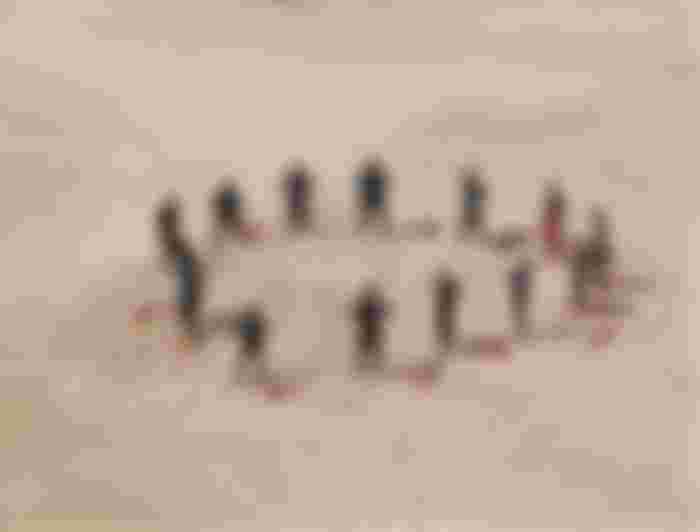"show me a man who does a good job, and i'll show you a man worthy of the company of Kings." Anonymous

A group of laborers were digging holes in a city streets.. After blasting through six inches of asphalt and concrete with an air hammer, and shoveling out rock, sand and soil to about five feet deep, the Boss inspected the hole and shouted, "Okay, fill up the hole." Then they move down the street to dig another hole, and when it was five feet deep, the Boss would look at it again and shouted, "Okay, fill it up." This went on all morning.
After lunch, the men came to the Boss and declared, "We are quitting work. Give us our pay." One of the men blurted out, "We quit because no one is going to make fools of us. Just dig holes and fill them up again!" "Oh," said the Boss, "Is that your problem? The records of this old section of the city has been lost, and we are trying to find the water mains." (Heiges, 1958,pp4-5)
The men went back to work after knowing the meaning of digging holes. Deep in our hearts we long to know the meaning of what we do.
What is the meaning of work? What should be our attitude toward our daily work?
The Function of Work
Work is the use of our mental and physical abilities to accomplish a certain task. The meaning of work lies in its functions both for the worker and for others in society.
Work is necessary to maintain human life. Human beings have physical, emotional, and spiritual needs as individuals and as a community. We work to eat. The general expectation is a worker works in order to earn a living. Labor is rewarded with some kind of remuneration or wage through a system of exchange. Food, clothing, and protection are basic human needs. Men work to meet their physical and material needs.
But we also have social and spiritual needs. Most men know why they work but they differ in their conceptions of the reasons for their work. They work to earn a living to provide for their needs and their families. However, they have other reasons beyond meeting economic needs. They work to express their loyalty to their fellow workers and because they enjoy their companionship. They find satisfaction in being with others at the place of work.
Related to these is our concern for the needs of others. Most men work out of concern for their families. Families depend on a working member to enable them to live and to pursue educational and other pursuits in life. Related to this, we work to express our concern for the needs of our communities. Life on this planet could not be maintained if most of us refuse to work. The world is one interdependent social system. It is marked by a "give and take" relationship. Through our work we not only meet our personal needs and the needs of our immediate families but also those of our neighbors and communities. All of us provide a variety of services depending on where we serve and the kind of work we do. It is in this sense that work is a "practical expression of neighbors-love"(Gardner, 1960,p.293). The farmer provides necessary products so does the manufacturer. The teacher educates the children of the farmer and the manufacturer.
In the practice of his profession the physical ministers to our physical and heath needs. Out of a sense of loyalty and love of neighbor, the policeman performs his duty to protect the citizens. Love of neighbor can be:
translated into the customer or the client whom the worker perhaps sees once in his life, into the consumer of the goods he produces whom he will never know, into the enterprise or occupation in which he works, into the work fabric of society of which his work is a function. (p.293)
It is when work is seen as an expression of love of neighbor that it takes on a special social significance and religious meaning.
It is also through meaningful activity that the worker attains self-realization through the exercise of his creative powers. God, the Creator has given capacities to men which can be developed only through their use. Each of us has an urge for creative self-expression. The carpenter, the writer, the musician, the engineer, the architect, the mason- these and others desire not only to earn a living through work but also to create new forms and to impart values that enrich our creative talents that we attain self-realization and satisfaction. Work provides the avenue for the urge toward creativity and self-expression.
The exercise and use of one's talents should not only be for the good of the self but for the service and enrichment of others. It is is enriching others that the self is realized and fulfilled.
God's purpose in creation provides meaning to work. It is God intention for man to subdue and exercise dominion over the earth, Man's task is to:
be fruitful, and multiply, and replenish the earth, and subdue it, and have dominion over the fish of the sea, and over the fowl of the air, and over every living thing that moves upon the earth. (Gen.1:28)

As creatures made in God's image, man has been given the prerogative of being God's partner in shaping the world and history to fulfill God's overall purposes. Fulfilling this mandate involves responsible and obedient stewardship in the use of time, physical effort, and the creative use of his mental and spiritual powers. Obviously, the exercise of stewardship requires work- the invention and use of implements and tools, planning, oversight-in order to fulfill the purposes of the Creator. It is through work that:
man thus shares the creation-purpose of God in subduing nature, whether he be a miner with dirty hands, a mechanic with greasy face, or a stenographer with stencil-smudged fingers. (Henry, 1980, p.48)
Viewed in this way, work is filled with purpose as it is:
intended to serve God, benefit mankind, and make nature subservient to the moral program of creation. Man must therefore apply his whole being-heart and mind, as well as hand- to the daily job. As God's fellow-workers, we are to reflect God's creative activity on Monday in the factory no less than on Sunday when commemorating the day of rest and worship. (p.48)
Work reveals one's inner being and character. The workman is known by his product. The whole of creation and everything in it reflect the wisdom, power, and majesty of God. Scanning the starry heavens one evening, the psalmist David saw the dazzling stars. The sight of it all led him to exclaim: "O Lord, our Lord, how majestic is your name in all the earth. You have set your glory above the heavens"(Ps.8:1). The whole of creation points to the creator.
In the same manner, a man's work bears the mark of his personality. It is the extension of himself. The way a man works and the product of his labor reflect his mental, psychological, and moral faculties. Long ago, there was an author of many handwritten books. When he wrote, he always wore a jacket, and the right cuff of his jacket was worn away with rubbing against the desk. Someone came to ask what he would say to God about himself when he would die, "If it comes to that, "he used to say," I think I'll show God the cuff of my jacket" (Barclay,1971, p.96). The way we work and the quality of our work certainly reflect our character.
Attitudes Towards Work
"Work while you work, play while you play." So the saying goes. However, there are people who play while at work ; others prefer to be idle. Our country men complain about the tardiness and laziness of workers in government and business offices. They complain about the (extended personal use of the telephone), mediocrity in the service, red tape (bribery)system, and long break times. Many employees simply live for the fifteenth and and thirtieth of the month to receive their pay.
The majority of workers are bored and do not enjoy the work. They do not find the meaning meaning in the daily routine of travel and work. Where indeed is the noble meaning of work "when the coffee break is the peak experience of the day?" (Heiges, 1958, p.1). Where is the dignity of work when you work simply because "you get paid on Friday, and you've got to do something because that's the way things are?" (Heiges, 1958,p.2).
The negative view of toil was clearly expressed long ago by the author of Ecclesiastes:
What does a man get for all the toil and anxious striving with which he labors under the sun? All his days his work is pain and grief; even at night his mind does not rest. (Eccl 2:22,23)
This negative feeling towards work as pain and toil is destructive both to the worker and the community. Hence, many feel that the most serious curse on work is the feeling of meaninglessness.
It is therefore necessary to recover the meaning of work as a vocation, as something purposeful. It should be recognized that he who does not work should not eat. The person who steals due to laziness," must steal no longer, but must work, doing something useful with his own hands; that he may have something to share with those in need.
See You Other Time...
zoni


good job bro..kep it up